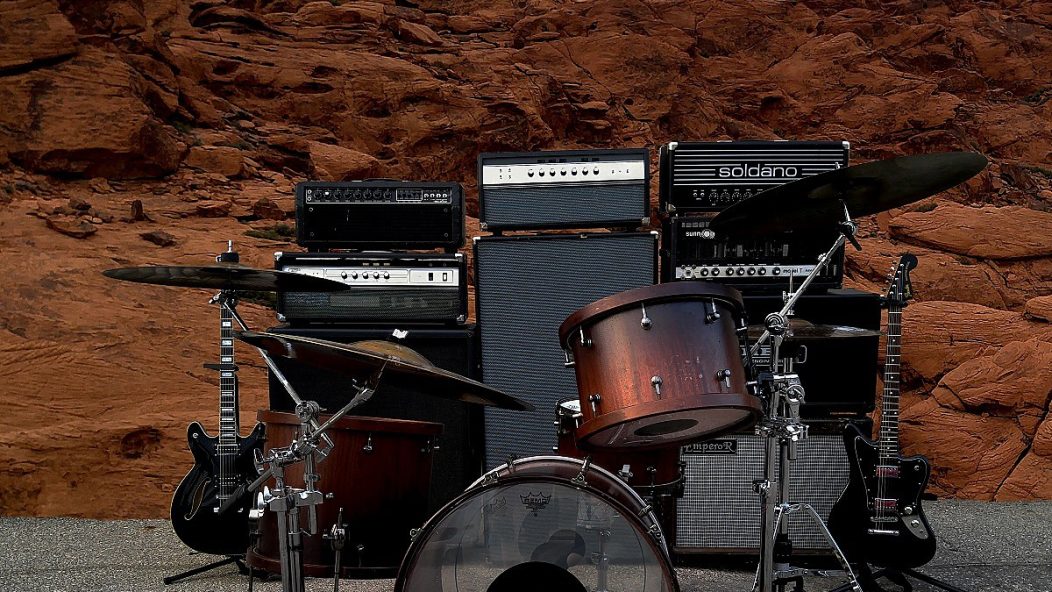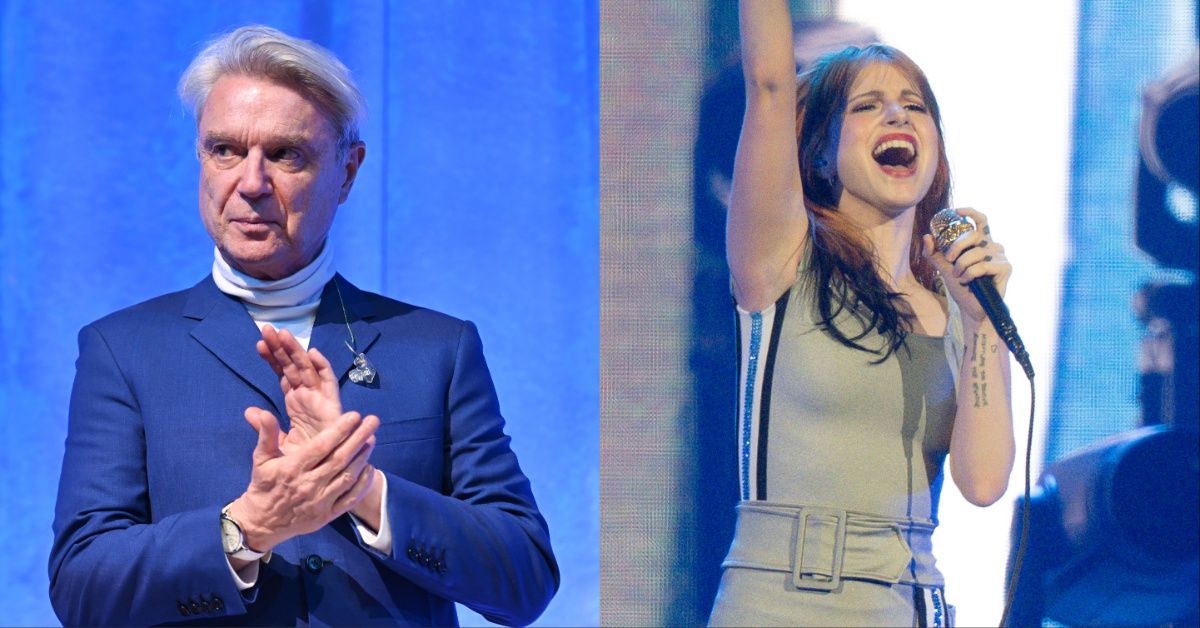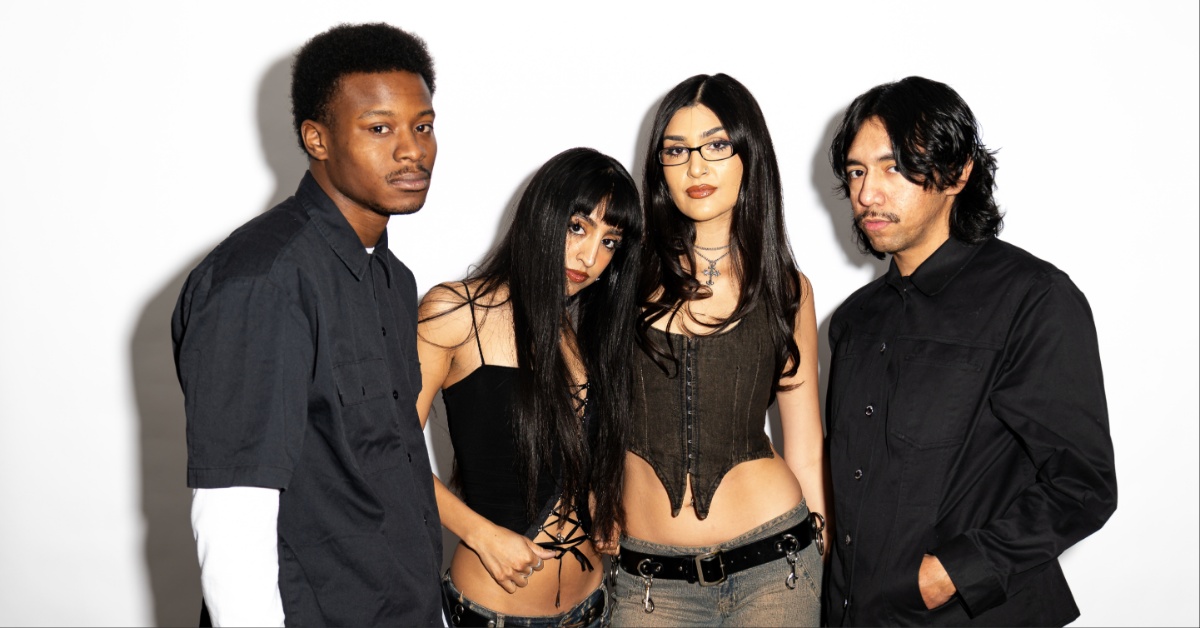
Interview: Hammerhands

…
In musical theory, the words “Largo” and “Forte” are used to direct musicians to play “slow” and “loud.” For Hammerhands, those words are more than a direction, they’re a philosophy–one that informs their entire sound and acts as the fitting title for their latest record.
Hailing from Mississauga (a suburb of Toronto), a city not really known for its metal, much less its patience, Hammerhands are a bit of an anomaly. With the release of Glaciers in 2013, the band established their love for slow tempos and daunting heaviness, the seeming antithesis to the musicians’ previous suburban spasmodic outings in groups The Love and Terror Cult, Strawman Fallacy and Dance Electric.
Hammerhands returned later that same year with a covers EP called 1995, featuring monolithic reworkings of Smashing Pumpkins and PJ Harvey tunes, before holing themselves back in the studio.
With the newly released record Largo Forte, Hammerhands have emerged from that three year creative period a wholly different beast. Previously, their style could be lumped in with the slew of post-metal/sludge bands that have popped up in the past ten years, but they’ve since warped their sound into something that’s uniquely their own. Recalling the vast epics envisioned by famed composer Ennio Morricone, Hammerhands contrast their heaviness with a dusty expansiveness. On “Where We Go,” Hammerhands find their twang, which is admittedly more Tom Waits and Tomahawk than southern or groove metal.
I spoke to Hammerhands’ NJ Borreta (vocals, guitar), Collin Young (guitar), Justin Hunt (bass), and Jon Galletly (drums) about their slow process, how they arrived at such a unique sound, and Young’s work documenting Toronto’s burgeoning metal scene.
. . .
…
…
You released the 1995 EP in 2013. At what point did you reconvene to write songs for Largo Forte?
Young: Probably in 2013. Once we were done the EP we started putting this together slowly.
Galletly: We just take a very long time to write.
Young: I think we spent the first year writing a song that we inevitably scrapped.
So is the title of the record a reference to how long it takes the band to make an album?
Young: Partially, yeah.
Hunt: That’s a good way to look at it.
Galletly: We work slow and we go hard.
Young: That’s packed into the philosophy of the band. Everything is slow. The music, the work ethic.
How did you finally get an entire record ready?
Hunt: Lots of demoing.
Young: Lots of phases of demos. There’s a writing at home demo, then we learn all of its tracks, then completed a live demo of it in our practice space.
Borreta: I think in particular the one thing that helped us out this time was we laid down preproduction. Which isn’t something we’ve really done before. Even in any of our other bands. It really helped iron out the kinks. You know it really helped us to scrutinize things a bit more.
Galletly: You give it the listen test. Sometimes you’re writing and you think what you’re doing is the coolest in the world. Then you go back and listen and think, ‘Hmmm, not so much’. So we tend to do a lot of cutting. The more important part is what you don’t put out. You can come up with a lot of fuckin’ ideas, there’s always ideas, but are they good ideas? Collin did a good job of writing in a bigger picture. Not just cool riffs that sound good together. A real song. An idea.
Borreta: We focused more on composition. Whereas before it was about trying to throw as much onto the pizza as we could, so to speak. This time around we went through the process. Which is also why we weren’t so prolific in the writing process. There were still certainly times when we struggled with inspiration. Like in that first little bit. There was that hump where we were stuck on that one song. But that was part of the process. We needed that one song to flesh things out.
Your first record was called Glaciers, and had glaciers on the cover. Largo Forte has a desert. You are absent from your own promo pic. It seems like Hammerhands are really interested in spaces where people are absent. How does that visual aesthetic link to your sound or the subjects you explore?
Young: Never connected those dots before.
Galletly: We’re just mysterious. No, we’re just not that good looking. Our gear is cooler than we are.
Young: You just want the music to be it’s own world. Pay no attention to the man behind the curtain.
Hunt: Nobody sees the wizard.
. . .

. . .
Do you think in terms of landscapes or deserts at all when you picture your music?
Hunt: I can maybe see that.
Young: That was thought of beforehand. Listening back to the music on the album, that just seemed like a theme. It’s the sound that came to mind, and I think we kind of talked about that before making the artwork that it should be… hot.
Hunt: Not as cold as Glaciers [Laughs].
Galletly: Hot, barren, vast.
This is kind of a loose connection, but the Italian name of your record, the western-y sounds explored on this record make me think you’re drawing from the work of Ennio Morricone.
Young: Yes. I don’t know. My tastes are maybe a little more low-brow and I’m thinking Quentin Tarantino and modern stuff like that. That element is definitely intentional.
Borreta: I think we kind of stumbled into the spaghetti western aspect of the sound. But once we did, we really grew to embrace it. I guess it’s not really a theme that’s commonly found in the type of genre that we would belong to, or even in the broader spectrum of metal. But we saw something unique in it and I think that’s why we latched onto it. On top of that, Collin took a lot of creative initiative with this record, and whether he drew direct inspiration from spaghetti western or not, it was there, and it was great. Let’s just keep riding that horse.
There’s a wider range of styles deployed on this record than your previous, but it still sounds consistent. How do you decide what sounds like Hammerhands and what doesn’t?
Young: It’s probably more the stuff that doesn’t sound like Hammerhands that’s intriguing. Trying to get away from the repetitive pigeonhole that is metal. It’s too easy to keep on replicating the same sounds. I made the concerted effort to find things that didn’t sound like crushing metal riffs, but still seemed to work and not be completely left field for the sake of it.
Borreta: There’s still our appreciation for the slower tempos. And even though we pushed the envelope of dynamics a bit more, it always ends up somewhere loud at some point. Going back to what you had said with regard to that recurring theme of isolation–that seems to stand true with this record. With Glaciers, yes there’s definitely that idea that as a man you’re an island, wherein this case you’re a lost wandering hombre. Either way that isolation still persists.
Key to that stylistic diversity seems to be the fact that each instrument, each part sounds distinct. Is that the result of years of being together or a conscious effort?
Galletly: That was a conscious effort, 100%. I think even on the last album, one of the bigger qualms we had was about the big wall of sound. We’re still proud of the ideas and they were good songs, but sometimes there was a little mud with everything that was happening. I like when you can hear that separation, where everything has something to offer to the sound of it. Its tough, especially in the genre we’re in, things go loud and it’s easy for them to get lost. Its nice when the instruments have their own voice, their own place in the mix.
Young: I think there’s an unavoidable limitation to being in a rock band format of making music. There’s two guitar players, a bass player, a drummer and a singer. I like a lot of more experimental, or noisy or electronic stuff where there are layers and waves and tonnes of stuff crashing around you. I tried to replicate that as much as possible with what we’re doing. If two people are playing the same riff, you’ve wasted an opportunity.
Borreta: We value the individuality of our tone in our instruments.
Hunt: We put so much time and effort into developing each of our tones.
Borreta: It would be a waste to just wash each other out. There are definitely moments where it’s nice to pile it on thick, but you know, to be able to discern each other’s parts, and allow them to breathe…
Hunt: Compared to Glaciers, where we recorded with a lot more gear, borrowed from a lot of friends and stuff, but with Largo, we did it with our own gear.
Galletly: We found our sound.
Hunt: I think the only thing we added from outside the group was our friend Matt Brown’s reverb. He has a really old, sexy reverb tank. You hear it on the album, clearly.
Borreta: He’s a pal of ours and a gear aficionado, and has a lot of cool vintage stuff, so we called in a favour for that, and the sound from it plays into that whole spaghetti western theme.
Collin, is it more difficult to record and engineer your own band’s record than someone else’s?
[Everyone but Young laughs]
Young: There’s a deeper rabbit hole of insanity that one will go on.
Borreta: It’s pretty deep.
Young: Not to downplay what I do with other bands, but there’s more of a, “Well that’s what they sounded like, this is what they sound like, I’ve done my part here,” attitude, whereas with our band I have the exact sound of what I want in my head, and I have to somehow achieve that. It’s never quite right.
It seems like Hammerhands has more in common musically with the bands Collin records (Animal Faces, Demonic Possessor, Godstopper) than any bands in Mississauga.
Hunt: I think a lot of that has to do with the fact that the rest of the band has all been in other bands, and played with more bands from Toronto, than the bands from Mississauga. There’s almost a kind of generation gap, a lot of the bands playing in Mississauga are a lot younger.
Galletly: A bunch of venues shut down for awhile, but now we’ve got a few back so there’s young people making the kind of spastic rock that we did when we were their age in the suburbs.
Hunt: There are still a lot of older bands. Never Trust A Wizard are good friends from ours and they’re from Mississauga.
Young: But again, that’s another band that I’ve recorded. I’ve been lucky that I’ve gotten pigeonholed by people who end up coming to me as clients. They’ve heard about me through either something I’ve worked on or another band I’ve done, which is all noisy off-kilter crap. The stream of noisy off kilter crap just flows together, and filters through me. I guess it’s just the whole DIY aesthetic. So bands that appreciate that, and I record people for cheap, so if you’re DIY, no one is giving you any money, and you can afford me.
…











